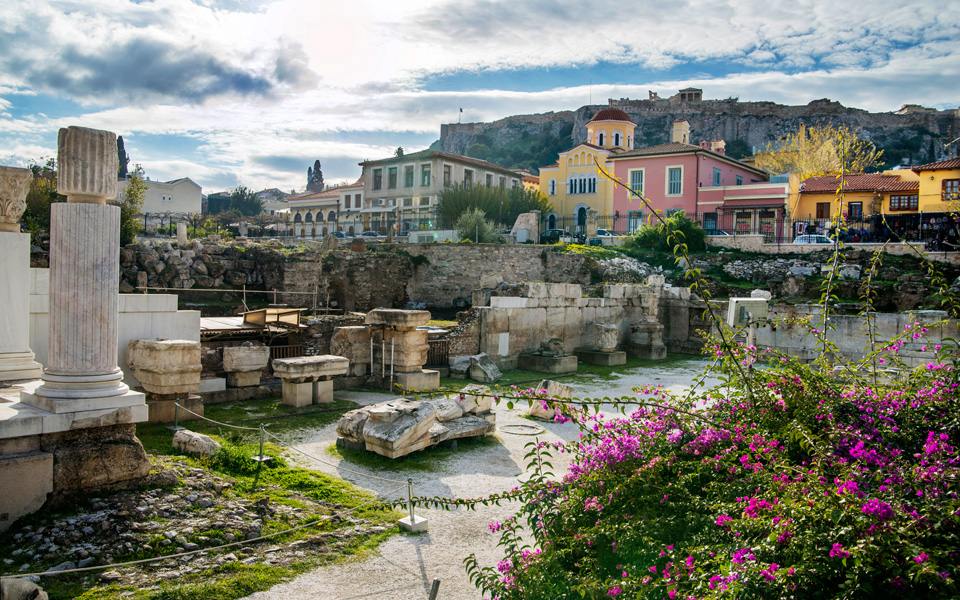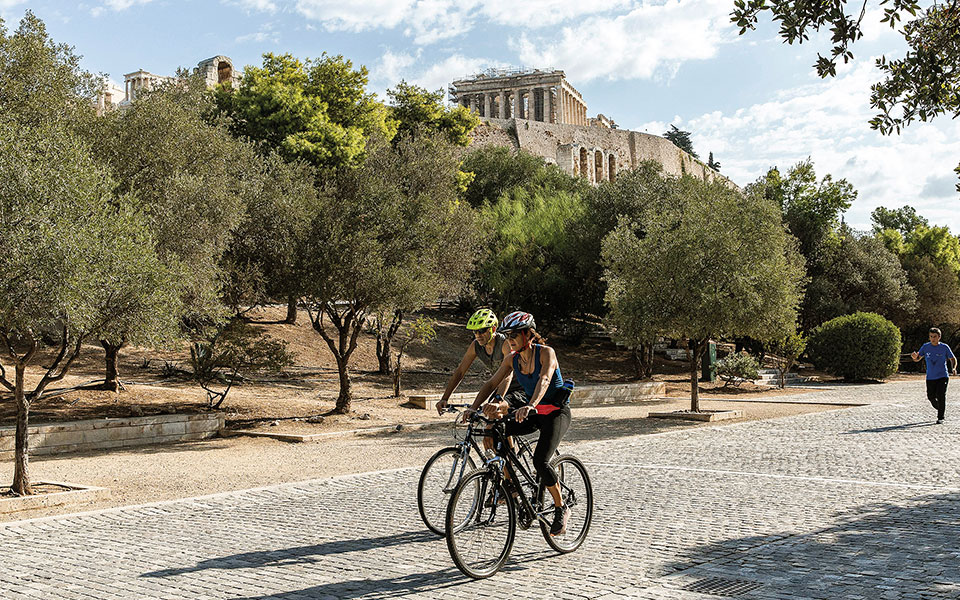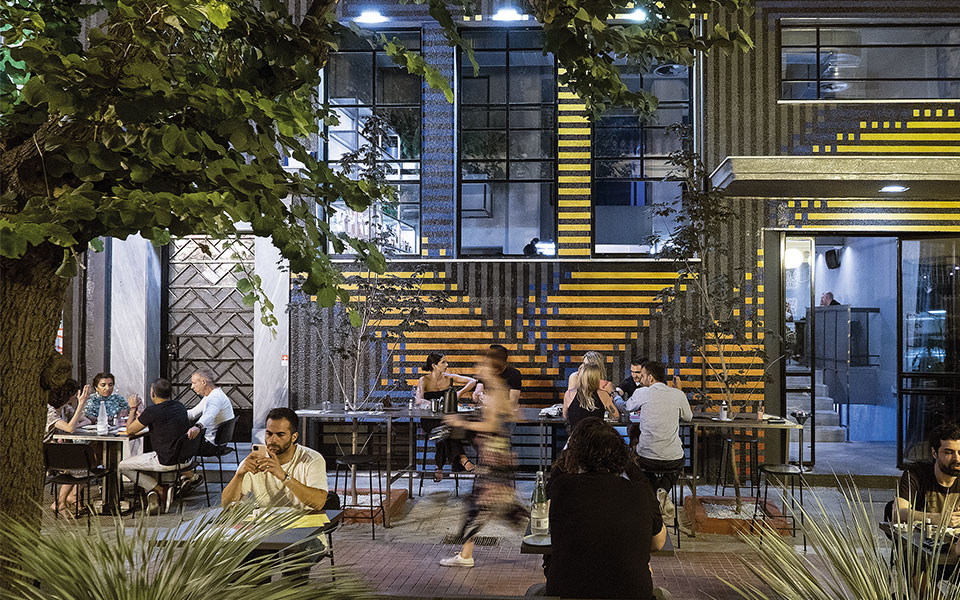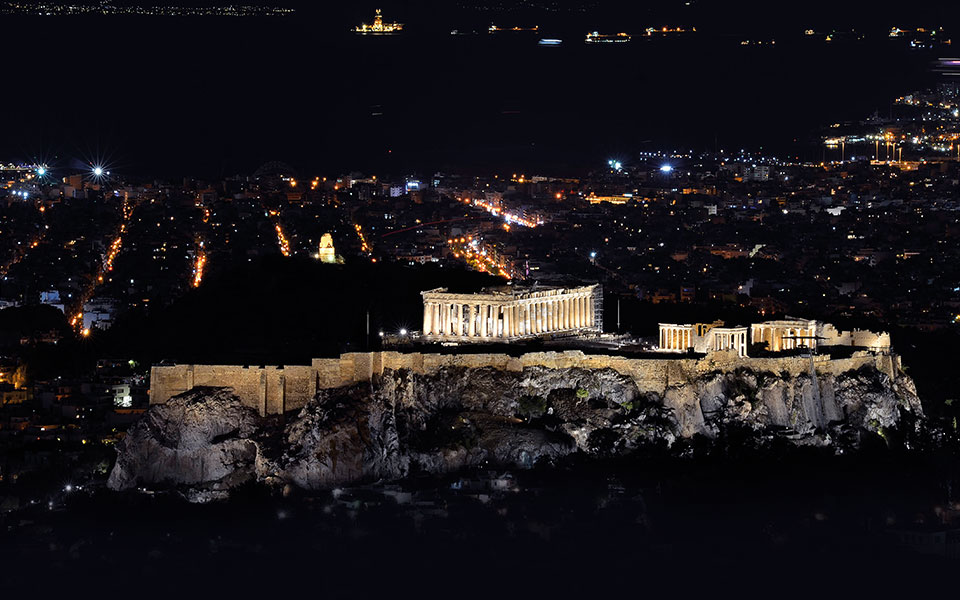It’s not easy to stand back and look objectively at the city where you’ve lived all your life.
You’ve seen it go through rough patches, transform itself, suffer wounds, and rise to its feet again. And then, just as it’s marching successfully towards a brighter future, welcoming 6.3 million foreign tourists in 2019, you see it freeze once more, this time in the midst of a global standstill.
The storm of the pandemic is still raging, but even when calm returns, the Greek capital – which recorded a significant increase in visitor arrivals in the first two months of 2020 compared to the previous years – will be mopping up the floodwaters for some time.
In the evenings prior to the second lockdown, the few lit hotel rooms on Syngrou Avenue acted as an informal barometer. The avenue, which starts at the Temple of Olympian Zeus in the city center and ends at the seafront, has established itself over the past couple of years as a new hospitality hotspot, with new hotels opening one after another.
Visitors, however, remain scarce and the outlook for the next few months remains challenging. According to the Hellenic Chamber of Hotels, there are 491 hotels in Attica. Out of these, only 318 reopened after the first lockdown.

© Olga Charami
“We don’t yet know under what conditions we will be operating,” says Alexandros Vassilikos, the Chamber’s president. “The bookings we had are gradually being canceled, as conferences aren’t taking place any longer and city breaks are drying up, so a big part of our winter business has been lost. And all of this in a context of oversupply… combined with the fact that short-term letting was left unchecked.
“It is clear that city hotels need to be supported, as this is where investment is, so that the city can flourish on the multipliers of tourism and absorb the income into its productive fabric. Every euro spent on accommodation translates into €4 of spending on shopping, eating out, entertainment, and so on.”
In the space of a year, between August of 2019 and August of 2020, over 3,000 listings in central Athens have been removed from short-term letting platforms. The pandemic acted as a catalyst: the short-term rental market seems to be returning to the levels of three years ago, before indications of oversupply were observed in less touristic areas such as the northern suburbs. Rents have stayed high, and it remains to be seen whether long-term renters will return to Athenian neighborhoods they were forced to leave in recent years.
“Tourists haven’t vanished, they’re just fewer of them,” says one resident in the neighborhood of the Acropolis. “Out of nine apartments in my building that were used as vacation rentals last March, three continued to host guests until very recenlty, and at a satisfactory rate.”

© Kostis Ntantamis/AFP/Visualhellas.gr
A CITY IN THE SUN
In the middle of the day in the alleys around Mitropoleos Street in Syntagma, where this time last year you needed luck on your side to find a sidewalk table, things have changed. In part because the rise of remote working means fewer people commute to the center, and in part because of reduced tourist traffic, one walks through a different Athens these days.
It is stunned and a little wobbly, but still very much holding on to its identity. Even if the sky clouds over for a time, metaphorically speaking, the city finds a way to blossom in the face of its contradictions, the same ones that give it its perennial charm.
“For our part, we continue to upgrade our municipal services to offer a better and more accessible city to residents and visitors” say the people at City Hall. “Athens is continually becoming more hospitable. We prove this every day, with the cleaning operations which we set as our priority from the outset; in every neighborhood, we’ve instituted a coordinated anti-graffiti campaign, and we’re maintaining and improving green spaces and upgrading our infrastructure.”
Yiannis Tsakalos, founder and managing director of the strategic marketing firm AQ Strategy and an experienced observer of the Athens tourist scene, sees the city facing a substantial challenge. “The city has unique experiences to offer, but they need to be incorporated into a strategic plan so as to be properly promoted. Athens isn’t just a destination, it’s a unique experience that has to be lived.
“This particular set of circumstances gives us an opportunity to focus strategically on this approach, which is what the new generation of travelers is after. How many potential visitors know that in 20 minutes they can go from the center to the beach, or that in an hour they can be skiing down a mountain in winter? Or that every day in Athens can hold a new surprise for them: gastronomy, culture, the people, the city’s vitality? This approach will differentiate the city strategically and give it a competitive advantage.”
For Tsakalos, the key is being able to adapt to change, something that the pandemic has accelerated. “The question is whether Athens can adapt and turn the crisis into an opportunity.”

signs of hope
Over the period of January to August just 3.9 million arrivals were recorded at Eleftherios Venizelos International Airport, compared to 15.8 million in 2019. The city, however, remains hopeful of returning to its previous levels of life and energy.
To honor its timeless symbol, the Acropolis, a new lighting system was launched in October, designed by Emmy Award-winner Eleftheria Deko. The new lighting design better highlights the different monuments on the Sacred Rock as distinct from each other and from the walls. Additionally, a new elevator and disabled access routes will be in operation by the end of December.
Meanwhile, work to transform the National Gallery into a state-of-the-art museum continues apace, so that in March of 2021 contemporary Greek artworks will be able to return to their newly renovated permanent home. Talk is intensifying of a future metro extension that will serve the western and southern suburbs of Athens, an extension that will also provide much improved public transport links to the Stavros Niarchos Foundation Cultural Center.
New hotels are being added to the city’s accommodation options, such as the Athens Capital Center Hotel – MGallery Collection, a 60-million euro investment and the first five-star hotel of an international chain to open in the center since 2004. Another new arrival is that of the Israeli Brown Hotels chain in the area of Omonia.

© Dimitris Michalakis
New approaches to business are being trialed in the field of dining, even in the face of unprecedented market challenges. Two of the city’s leading restaurants, Nolan and Proveleggios, both owned by the same ambitious entrepreneur, Kostas Pissiotis, have set up an initiative called PS Luncheon, with home delivery options from their renowned menus that also include three DIY meals (pizza, ramen and tacos).
The Hotel Grand Bretagne is offering a gastronomic experience brought directly to you at home: five different menus packed and delivered with care and style. The Electra Hotel venues in Athens and Thessaloniki are launching new concepts such as their “Work From Hotel” program for business travelers, who also benefit from discounts at the hotel rooftop restaurants.
The Great Walk, the urban intervention that the City of Athens has piloted with the aim of unifying the city center through the widening of sidewalks on busy routes, the rerouting of traffic and the introduction of cycle lanes, has divided public opinion, with drivers and pedestrians reacting differently, but the initiative has support.

© Yiorgis Yerolymbos
“Tourism is an extension of residents’ lives. What visitors see is locals living their everyday lives. If the latter are happy, the former will be, too,” notes Ioanna Dretta, managing director of Marketing Greece, a partnership formed between the Greek Tourism Confederation and the Hellenic Chamber of Hotels to promote Greek tourism.
“The trend for sustainability and ‘green’ travel was reinforced by the pandemic. In that context, the city needs infrastructure such as the Great Walk, but for it to work for tourism, it has to be supported by relevant products. For example, it should be included in organized or self-guided tours. In Greece, we often confuse the infrastructure with the product. The fact that Athens has a National Garden is not enough. For visitors to get to know it and enjoy it, they must be able to participate in an interesting activity within it.”
A few kilometers to the east in Pangrati, the Basil and Elise Goulandris Foundation, the art museum that opened its doors almost exactly one year ago, is still closed but waiting to relaunch itself on the city’s culture scene. The ventilation system has been replaced with an open circuit one to pump fresh air into the interior, electronic ticketing will include specific time slots with a limited number of visitors, and new digital products are being rolled out.
“This period is harder for us, because as a new museum we don’t have a stock of activities, therefore we need to develop material rapidly at a time when revenues are low,” explains Head of Business Development, Katerina Markadaki.
Adaptability is the watchword. The sooner the city appreciates that, the better. There have been plenty of exciting new public projects and individual initiatives. How exactly the city will capitalize on these when things go back to normal is something that will become clearer over time.
This article first appeared in the print issue Greece Is Athens Winter 2020-2021 with the title “Looking Ahead”. The magazine, along with other past issues, is available for order at our eshop.











